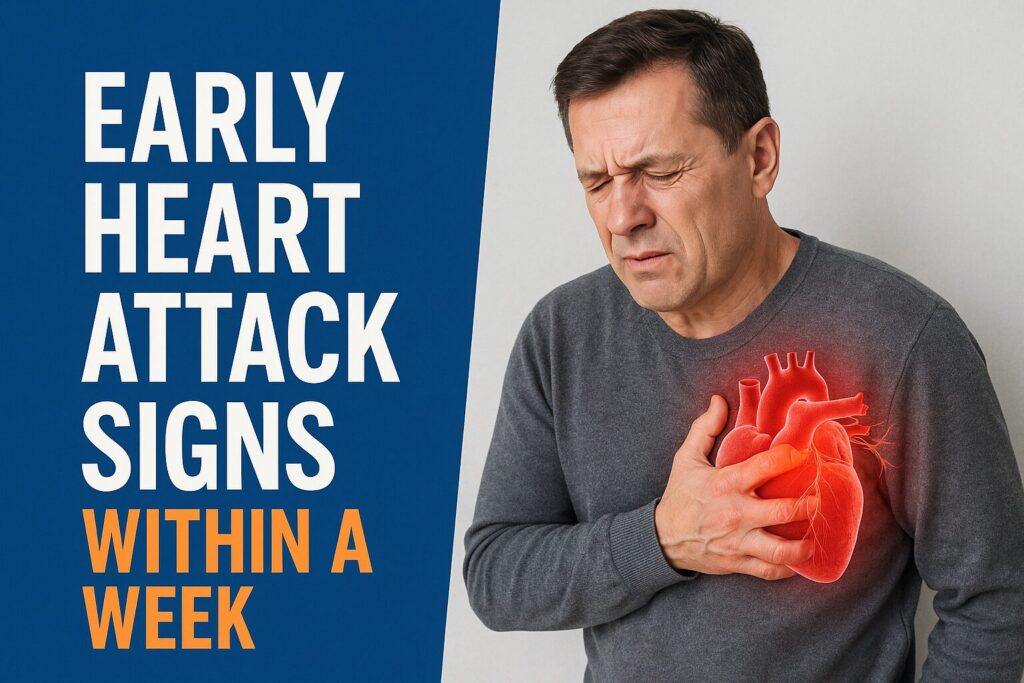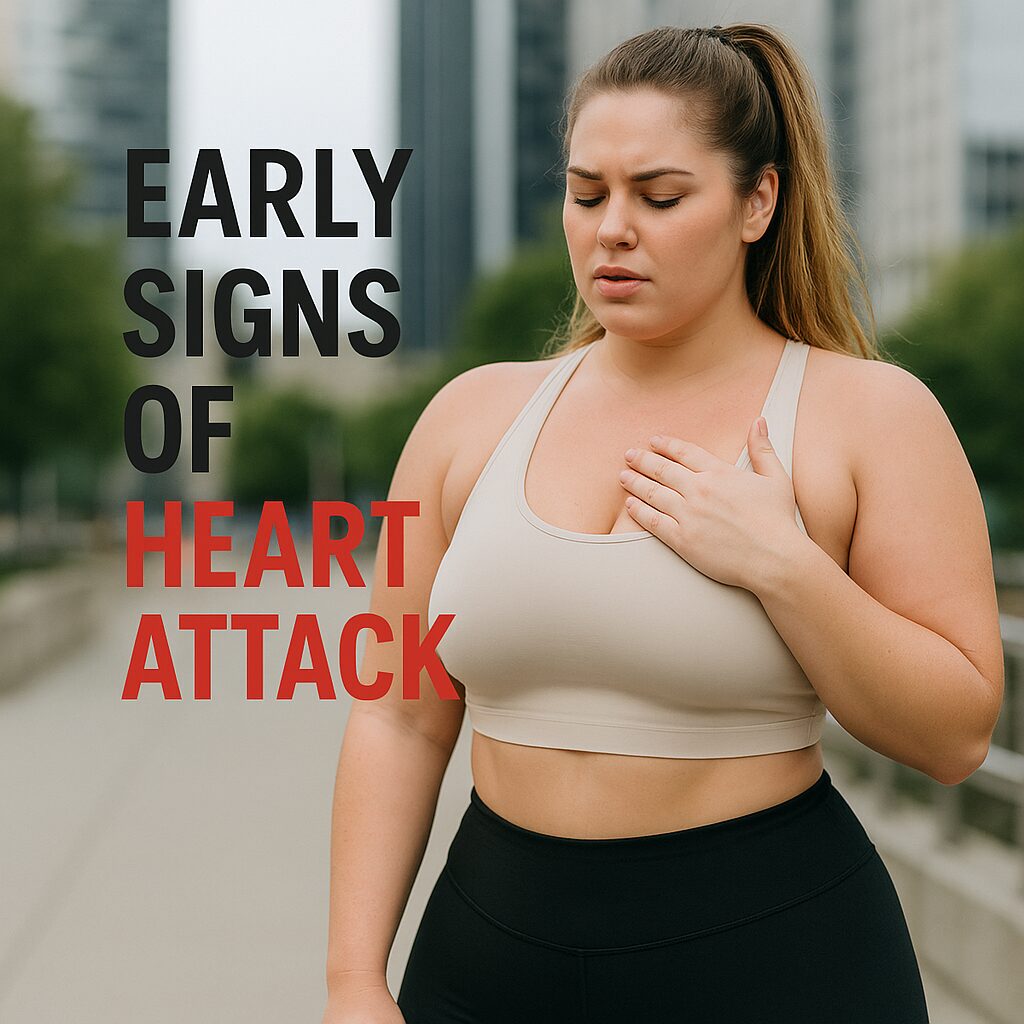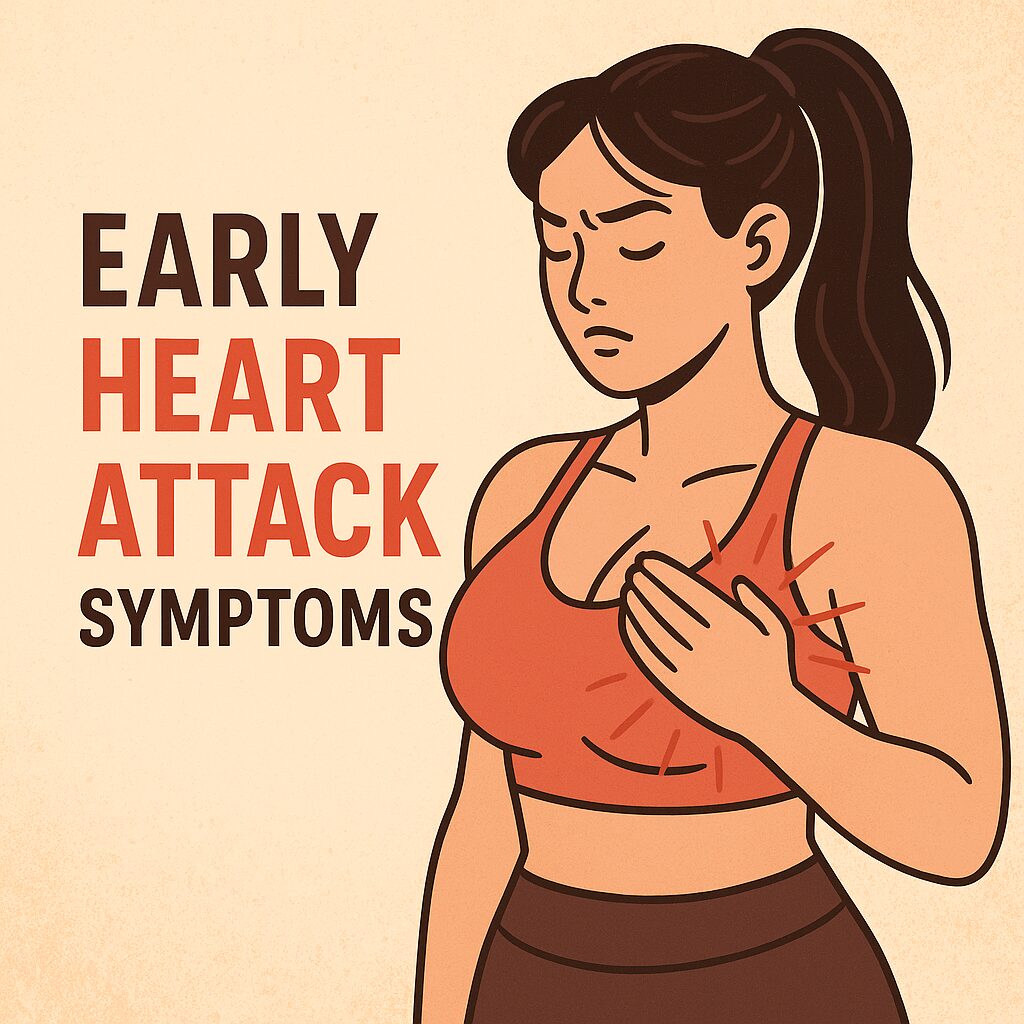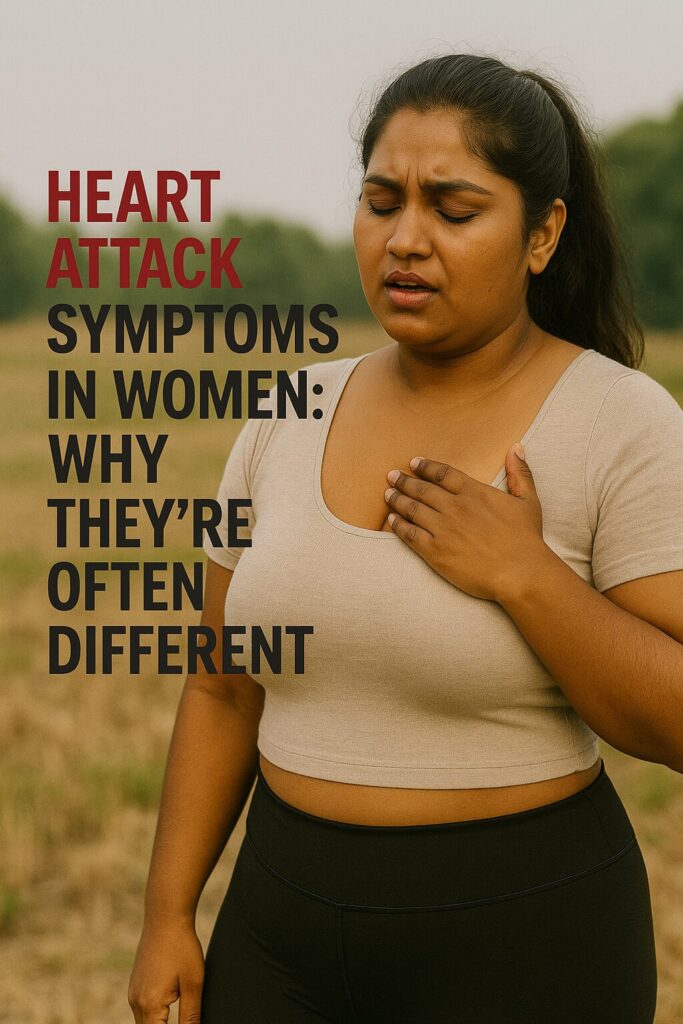It is very important to know the early symptoms of a heart attack in a week so that if any symptoms occur in the future, we can immediately consult a doctor.
Heart attacks often occur without warning, but in many cases, the body sends subtle signals several days in advance. Recognizing these Early symptoms of heart attack in a week could be crucial in saving a life. In this article, we will discuss seven important warning signs your body is showing and what steps you can take to protect your heart health.

What does “early symptoms of heart attack in a week” mean?
Heart attacks don’t always happen suddenly. Studies show that symptoms can appear up to seven days before the event. These early symptoms are often mild and mistaken for less serious illnesses such as indigestion or stress. Understanding these symptoms can help you react quickly. So that’s why it’s better to know what early symptoms of heart attack in a week are.
⏱️ Why early detection is important
Many people believe that heart attacks occur without warning. But in fact, early heart attack symptoms are common within a week and often go unnoticed.
⏱️ Why early detection is important
Many people believe that heart attacks occur without warning. But in fact, Common early symptoms of heart attack in a week and often go unnoticed.
- 85% of heart attack survivors remember unusual symptoms in the days before the event.
- Early recognition of symptoms allows for preventive treatment and rapid emergency response.
7 Critical early symptoms of a heart attack in a week
Let’s break down the early symptoms of heart attack in a week into a day-wise pattern:
1. Mild Chest Discomfort or Pressure
This is one of the most common symptoms. It may feel like:
- A slight heaviness or tightness in the chest
- Discomfort that comes and goes, especially during physical activity
Rad Also: Heart Attack Symptoms in Women: Why They’re Often Different
2. Unusual Fatigue or Weakness
Feeling unusually tired, even without much physical exertion, is a common early sign, particularly in women. This fatigue may:
- Persist for several days
- Be accompanied by general weakness or a lack of energy
3. Pain in Jaw, Neck, Back, or Arm
Pain that radiates to these areas is often overlooked. It’s usually:
- More prominent on the left side
- Sporadic but noticeable during moments of rest or activity
- An important warning sign in terms of the Early symptoms of heart attack in a week.
4. Difficulty breathing with minor exertion
Struggling to breathe during simple tasks like walking or climbing stairs can indicate reduced oxygen flow to the heart. Look for:
- Tightness in the chest
- A feeling of breathlessness that’s unusual for you
5. Nausea, Sweating, or Lightheadedness
These symptoms may mimic conditions like the flu but can be heart-related. Watch for:
- Profuse sweating without physical activity
- Feeling faint or dizzy
- This is one of the main early symptoms of heart attack in a week in men.
6. Indigestion or Heartburn-Like Pain
Often mistaken for gastric issues, this discomfort could be an early sign of a heart problem. It may:
- Occur shortly after meals
- Feel like a burning sensation in the upper abdomen
7. Anxiety, Restlessness, or Unexplained Stress
Sudden feelings of unease or impending doom can be your body’s way of signaling a problem with your heart. These emotional signs often accompany physical symptoms.
⚠️ Many patients notice the Early symptoms of heart attack in a week, so don’t be one of them.
May Concern: Early Heart Attack Symptoms
Gender differences: men vs. women
In men:
- General symptoms such as chest pressure, arm pain, and shortness of breath are common.
- In many cases, symptoms appear suddenly.
In women:
- Early symptoms are more subtle and easy to ignore.
- Common symptoms:
- Jaw pain
- Pressure in the neck or back
- Nausea or dizziness
- Insomnia
- Women are more likely to delay seeking medical help.
When to See a Doctor Immediately
If you experience two or more of the above symptoms within a short timeframe, consult a healthcare professional without delay. Seek immediate medical attention if:
- Symptoms are severe or worsening
- You have risk factors like high blood pressure, diabetes, or a family history of heart disease
How to Track and Talk to Your Physician
To ensure accurate diagnosis and treatment:
- Keep a record: Note the time, duration, and intensity of symptoms.
- Describe your symptoms clearly: Mention any patterns or triggers you’ve noticed.
- Ask questions: Inquire about diagnostic tests like ECGs or blood work.
Research Insights & US Data
According to the American Heart Association (AHA):
- Around 85% of heart attack victims reported mild symptoms in the days leading up to the event.
- Women are more likely to experience fatigue, nausea, and anxiety as early signs.
These findings highlight the importance of awareness and timely action.
A Real-Life Incident: Recognizing Early Heart Attack Signs Within a Week
It was a regular Tuesday morning when 45-year-old Sarah noticed something unusual. She felt a mild discomfort in her chest, which she brushed off as stress from her hectic job. Over the next few days, she experienced increasing fatigue, occasional shortness of breath, and a slight pain radiating to her left arm. These were the early heart attack signs within a week, but Sarah had no idea they were warning her about an impending crisis.
By Friday, Sarah’s symptoms became more frequent. She remembered reading about early heart attack signs within a week in an article online, which emphasized how seemingly mild symptoms could escalate. Feeling uneasy, she decided to visit her doctor.
At the clinic, her physician immediately recognized the classic early heart attack signs within a week and ordered an ECG. The results confirmed Sarah was on the brink of a major cardiac event. Thanks to her quick action, Sarah received life-saving treatment and avoided a full-blown heart attack.
This incident underscores the importance of recognizing the early heart attack signs within a week and acting promptly. Symptoms like mild chest discomfort, fatigue, and shortness of breath are not to be ignored. Sarah\u2019s story is a reminder to stay vigilant and educate yourself about the early heart attack signs within a week, as they could mean the difference between life and death.
Always prioritize your health and seek medical attention if you notice any early heart attack signs within a week. Awareness can save lives.
Prevention Tips Post Warning Signs
After experiencing early warning signs, take proactive steps to reduce your risk:
- Adopt a heart-healthy diet: Include more fruits, vegetables, and whole grains.
- Exercise regularly: Aim for at least 30 minutes of moderate activity most days.
- Manage stress: Practice mindfulness, yoga, or deep breathing.
- Monitor your health: Regular check-ups can identify potential issues early.
Frequently Asked Questions (FAQs)
Can Women Experience Different Early Symptoms?
Yes. Women often experience more subtle symptoms like fatigue, nausea, and anxiety compared to the classic chest pain observed in men.
Does Existing GERD Mask Symptoms?
Yes, heartburn from GERD can mimic heart-related chest discomfort. If your symptoms persist or feel different, consult a doctor.
How Long Before Chest Pain Starts?
Chest pain may occur hours to days before a heart attack. It’s important to pay attention to any unusual sensations in your chest.
Final Thoughts
Recognizing the early heart attack signs within a week can make all the difference. By understanding these symptoms and seeking timely medical advice, you can protect yourself and your loved ones from a potentially life-threatening situation. Prioritize your heart health today!





